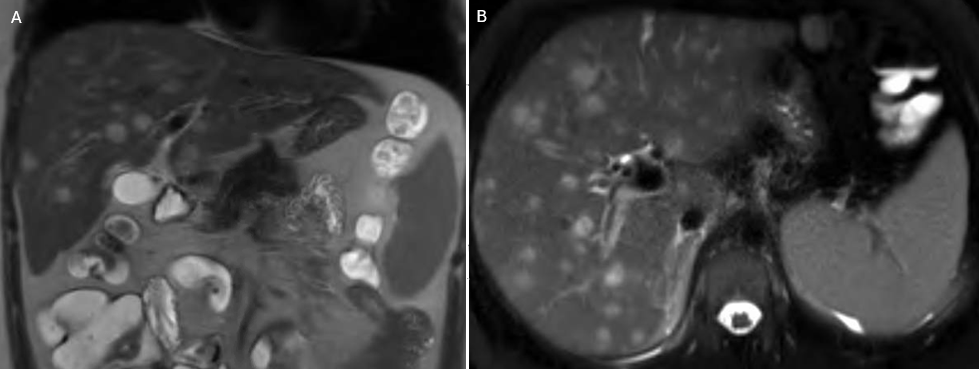Sunday Poster Session
Category: Infections and Microbiome
P1358 - From Diarrhea to Diagnosis: Bartonella Infection Mimicking PTLD in a Kidney Transplant Recipient
Sunday, October 26, 2025
3:30 PM - 7:00 PM PDT
Location: Exhibit Hall

Antoine Sassine, MD, MBA
Trinity Health Grand Rapids
Grand Rapids, MI
Presenting Author(s)
Award: ACG Presidential Poster Award
Antoine Sassine, MD, MBA, Jasmine Zahid, DO, Christopher Murphy, MD
Trinity Health Grand Rapids, Grand Rapids, MI
Introduction: In immunosuppressed kidney transplant patients, systemic symptoms such as fever and weight loss warrant thorough investigation. Hepatic or splenic lesions in these cases raise concern for post-transplant lymphoproliferative disorder (PTLD), particularly in Epstein-Barr virus (EBV)-positive individuals. However, infectious imitation of PTLD must be considered. Bartonella infections are uncommon in solid organ transplant recipients, with gastrointestinal manifestations being particularly rare. We report a case of a young kidney transplant recipient presenting with diarrhea and weight loss, found to have multiple hepatic lesions on imaging concerning for PTLD, ultimately diagnosed with disseminated Bartonella henselae infection.
Case Description/
Methods: A 25-year-old female with end-stage renal disease due to dysplastic kidney and hypertensive nephrosclerosis, status post EBV-donor positive/recipient positive renal transplant, presented with two months of non-bloody watery diarrhea (5–6 times/day, including nocturnal episodes), poor oral intake, and a 30-pound weight loss. She had adopted flea-infested kittens four months prior, reporting both kitten and flea bites.
On admission, she was febrile (103°F), tachycardic (HR 124), with acute kidney injury (Cr 2.05) and mildly elevated liver enzymes (AST 59, ALT 52). CT abdomen/pelvis revealed numerous low-density hepatic lesions, splenomegaly, and possible enteritis. Given her transplant status and EBV history, PTLD was high on the differential. MRI abdomen showed multiple enhancing nodular hepatic lesions, further supporting concern for PTLD.
An extensive infectious workup was initiated. Stool cultures, blood cultures, and endoscopic biopsies with immunohistochemical stains for CMV were all negative. Ultimately, a Karius test (plasma microbial cell-free DNA sequencing) identified high titers of Bartonella henselae. The patient was transitioned to doxycycline and rifampin, with quick improvement in fever and diarrhea. Repeat post-treatment imaging showed marked reduction in hepatic lesions. Given her clinical improvement, biopsy was deferred.
Discussion: This case illustrates the importance of maintaining a broad differential diagnosis in immunocompromised patients with systemic symptoms and hepatic lesions. Although PTLD is a serious concern in EBV-positive transplant patients, disseminated infections can present with overlapping clinical and radiologic features, including atypical pathogens such as Bartonella henselae.

Figure: Coronal (A) and Axial (B) MRI views showing multiple enhancing nodular hepatic lesions.
Disclosures:
Antoine Sassine indicated no relevant financial relationships.
Jasmine Zahid indicated no relevant financial relationships.
Christopher Murphy indicated no relevant financial relationships.
Antoine Sassine, MD, MBA, Jasmine Zahid, DO, Christopher Murphy, MD. P1358 - From Diarrhea to Diagnosis: Bartonella Infection Mimicking PTLD in a Kidney Transplant Recipient, ACG 2025 Annual Scientific Meeting Abstracts. Phoenix, AZ: American College of Gastroenterology.
Antoine Sassine, MD, MBA, Jasmine Zahid, DO, Christopher Murphy, MD
Trinity Health Grand Rapids, Grand Rapids, MI
Introduction: In immunosuppressed kidney transplant patients, systemic symptoms such as fever and weight loss warrant thorough investigation. Hepatic or splenic lesions in these cases raise concern for post-transplant lymphoproliferative disorder (PTLD), particularly in Epstein-Barr virus (EBV)-positive individuals. However, infectious imitation of PTLD must be considered. Bartonella infections are uncommon in solid organ transplant recipients, with gastrointestinal manifestations being particularly rare. We report a case of a young kidney transplant recipient presenting with diarrhea and weight loss, found to have multiple hepatic lesions on imaging concerning for PTLD, ultimately diagnosed with disseminated Bartonella henselae infection.
Case Description/
Methods: A 25-year-old female with end-stage renal disease due to dysplastic kidney and hypertensive nephrosclerosis, status post EBV-donor positive/recipient positive renal transplant, presented with two months of non-bloody watery diarrhea (5–6 times/day, including nocturnal episodes), poor oral intake, and a 30-pound weight loss. She had adopted flea-infested kittens four months prior, reporting both kitten and flea bites.
On admission, she was febrile (103°F), tachycardic (HR 124), with acute kidney injury (Cr 2.05) and mildly elevated liver enzymes (AST 59, ALT 52). CT abdomen/pelvis revealed numerous low-density hepatic lesions, splenomegaly, and possible enteritis. Given her transplant status and EBV history, PTLD was high on the differential. MRI abdomen showed multiple enhancing nodular hepatic lesions, further supporting concern for PTLD.
An extensive infectious workup was initiated. Stool cultures, blood cultures, and endoscopic biopsies with immunohistochemical stains for CMV were all negative. Ultimately, a Karius test (plasma microbial cell-free DNA sequencing) identified high titers of Bartonella henselae. The patient was transitioned to doxycycline and rifampin, with quick improvement in fever and diarrhea. Repeat post-treatment imaging showed marked reduction in hepatic lesions. Given her clinical improvement, biopsy was deferred.
Discussion: This case illustrates the importance of maintaining a broad differential diagnosis in immunocompromised patients with systemic symptoms and hepatic lesions. Although PTLD is a serious concern in EBV-positive transplant patients, disseminated infections can present with overlapping clinical and radiologic features, including atypical pathogens such as Bartonella henselae.

Figure: Coronal (A) and Axial (B) MRI views showing multiple enhancing nodular hepatic lesions.
Disclosures:
Antoine Sassine indicated no relevant financial relationships.
Jasmine Zahid indicated no relevant financial relationships.
Christopher Murphy indicated no relevant financial relationships.
Antoine Sassine, MD, MBA, Jasmine Zahid, DO, Christopher Murphy, MD. P1358 - From Diarrhea to Diagnosis: Bartonella Infection Mimicking PTLD in a Kidney Transplant Recipient, ACG 2025 Annual Scientific Meeting Abstracts. Phoenix, AZ: American College of Gastroenterology.

